| | Mathison Museum of Natural History |  |
|
+17Birdsage Bonnie Saarlooswolfhound widukind Joliezac spacelab Pardofelis landrover Megaptera lucky luke rogerpgvg Jill George pipsxlch Duck-Anch-Amun Kikimalou Roger 21 posters |
|
| Author | Message |
|---|
bmathison1972
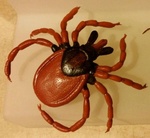
Country/State : Salt Lake City, UT
Age : 52
Joined : 2010-04-13
Posts : 6710
 |  Subject: Re: Mathison Museum of Natural History Subject: Re: Mathison Museum of Natural History  Wed Nov 10, 2021 12:45 pm Wed Nov 10, 2021 12:45 pm | |
| - widukind wrote:
- Could it be the only figure of that specie?
No; as the post indicates, Safari made it four times (only two sculpts thought, I think) |
|
  | |
bmathison1972

Country/State : Salt Lake City, UT
Age : 52
Joined : 2010-04-13
Posts : 6710
 |  Subject: Re: Mathison Museum of Natural History Subject: Re: Mathison Museum of Natural History  Wed Nov 10, 2021 12:46 pm Wed Nov 10, 2021 12:46 pm | |
| Species: Linuparus trigonus (von Seibold, 1824) (Japanese spear lobster; box lobster) About the Figure: Manufacturer: Kaiyodo Series: Chocoegg Animatales Series 3 Year of Production: 2000 Size/Scale: Total figure length 9.0 cm. Body length (excluding appendages) 5.0 cm for a scale of 1:10 Frequency of species in toy/figure form (at time of posting): Unique Miscellaneous Notes: This is one of seven species of spiny lobster (Palinuridae) I am aware of as figures/toys; the other six are all in the genus Panulirus. Being one of the original Chocoegg Animatales figures, some assembly is required. About the Animal: Geographic distribution: Indo-Pacific, from Japan to Australia Habitat: Benthic, at depths of 30-318 meters Diet: Predator on benthic marine invertebrates, including bivalves, gastropods, brittle stars, crustaceans, polychaete worms, and foraminiferans IUCN Status (at time of posting): Least Concern Miscellaneous Notes: Linuparus trigonus is not a common commercial species, but it eaten and sold in markets when caught, usually as bycatch by prawn trawlers. It has a thicker carapace than other spiny lobsters, and is described as having 'coarse flesh'. As such, it is often sold cheaper than other commercial spiny lobsters. [You must be registered and logged in to see this image.] |
|
  | |
widukind
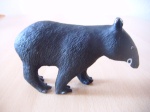
Country/State : Germany
Age : 48
Joined : 2010-12-30
Posts : 45745
 |  Subject: Re: Mathison Museum of Natural History Subject: Re: Mathison Museum of Natural History  Wed Nov 10, 2021 6:47 pm Wed Nov 10, 2021 6:47 pm | |
| |
|
  | |
Caracal
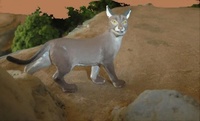
Country/State : France
Age : 65
Joined : 2018-10-24
Posts : 7252
 | |
  | |
bmathison1972

Country/State : Salt Lake City, UT
Age : 52
Joined : 2010-04-13
Posts : 6710
 |  Subject: Re: Mathison Museum of Natural History Subject: Re: Mathison Museum of Natural History  Thu Nov 11, 2021 1:13 pm Thu Nov 11, 2021 1:13 pm | |
| Species: Heterololigo bleekeri (Keferstein, 1866) (spear squid) About the Figure: Manufacturer: Kaiyodo Series: Capsule Q Museum - Squid Strap Collection Vol. 2 Year of Production: 2017 Size/Scale: Figure length 7.5 cm. Mantle length 5.5 cm for a scale of 1:7.3 Frequency of species in toy/figure form (at time of posting): Very rare Miscellaneous Notes: Figures in this set came as 'straps', but the chord is easily unscrewed leaving a tiny, hidden hole. Kaiyodo also made the paralarva stage of this species in 2014 for the Microcosmos collection in the Capsule Q Museum line. About the Animal: Geographic distribution: Northwest Pacific around Japan and Korea Habitat: Pelagic, at depths of 0-100 meters Diet: Marine invertebrates, fish IUCN Status (at time of posting): Least Concern Miscellaneous Notes: Heterololigo bleekeri is important in biological research. In addition to having its mitochondrial genome sequenced, its neurons are used in neurobiology research. Mantle muscles, which produce the escape jet response and aid in respiration, are controlled by L-glutamate and acetylocholine. Fin muscles, which act as a muscular hydrostat, appear to be controlled by 5-hydroxytryptamine. [You must be registered and logged in to see this image.] |
|
  | |
Caracal

Country/State : France
Age : 65
Joined : 2018-10-24
Posts : 7252
 |  Subject: Re: Mathison Museum of Natural History Subject: Re: Mathison Museum of Natural History  Thu Nov 11, 2021 7:39 pm Thu Nov 11, 2021 7:39 pm | |
| |
|
  | |
widukind

Country/State : Germany
Age : 48
Joined : 2010-12-30
Posts : 45745
 |  Subject: Re: Mathison Museum of Natural History Subject: Re: Mathison Museum of Natural History  Thu Nov 11, 2021 8:58 pm Thu Nov 11, 2021 8:58 pm | |
| A lovely figure from a lovely serie |
|
  | |
bmathison1972

Country/State : Salt Lake City, UT
Age : 52
Joined : 2010-04-13
Posts : 6710
 |  Subject: Re: Mathison Museum of Natural History Subject: Re: Mathison Museum of Natural History  Fri Nov 12, 2021 12:28 pm Fri Nov 12, 2021 12:28 pm | |
| Species: Dorcus hopei binodulosus Waterhouse, 1874 About the Figure: Manufacturer: Wing Mau Series: Flying Beetles Year of Production: unknown (Wing Mau's website states 'until 2006' so released in 2006 or earlier) Size/Scale: Body length (including mandibles) 5.5 cm, within scale 1:1. Wingspan 9.7 cm. Frequency of species in toy/figure form (at time of posting): Very common Miscellaneous Notes: Figures in this set are not marketed at the species level but represent species commonly made by Japanese companies. This figure is generic enough that it could easily represent another Dorcus (such as D. curvidens) but I am assuming it's D. h. binodulosus based on the latter's prevalence in the toy market (it can be additionally confusing, as hopei and binodulosus as separate taxa are sometimes considered subspecies of D. curvidens). This is the third time we've seen D. h. binodulosus in the Museum; it's probably the third most commonly represented species in my collection (certainly top 5). About the Animal: Geographic distribution: Japan, Korean Peninsula Habitat: Broadleaf forests Diet: Larvae breed in rotting wood; adults feed on tree sap IUCN Status (at time of posting): Not Evaluated Miscellaneous Notes: The popularity of beetle breeding in Asian countries such as South Korea and Japan has led to concerns that imported beetles (including D. hopei) representing different subspecies or genetic populations of their native counterparts might lead to cross-breeding if specimens escape or are intentionally released into the wild. The introduction of foreign populations could lead to allele frequency change in native populations which could have longterm negative effects on local populations, as well as competition between introduced and native populations for food and breeding sites and exposure to exotic parasites. [You must be registered and logged in to see this image.] |
|
  | |
Caracal

Country/State : France
Age : 65
Joined : 2018-10-24
Posts : 7252
 |  Subject: Re: Mathison Museum of Natural History Subject: Re: Mathison Museum of Natural History  Fri Nov 12, 2021 1:59 pm Fri Nov 12, 2021 1:59 pm | |
| Everywhere the same problem.. So many samples here too.. Beautiful model and display!   |
|
  | |
bmathison1972

Country/State : Salt Lake City, UT
Age : 52
Joined : 2010-04-13
Posts : 6710
 |  Subject: Re: Mathison Museum of Natural History Subject: Re: Mathison Museum of Natural History  Sat Nov 13, 2021 12:50 pm Sat Nov 13, 2021 12:50 pm | |
| Species: † Pleurocystites sp. (side bladder) About the Figure: Manufacturer: Kaiyodo Series: Dinotales Series 3 Year of Production: 2002 Size/Scale: Figure length 7.0 cm. Body (minus appendages) 2.0 cm for a scale of 1:1-1:2 depending on the species. Frequency of species in toy/figure form (at time of posting): Unique Miscellaneous Notes: Being one of the original Dinotales figures, some assembly is required. About the Animal: Geographic distribution: Late Ordovician of present-day Europe and North America Habitat: Benthic Diet: Zooplankton IUCN Status (at time of posting): N/A [prehistoric] Miscellaneous Notes: Pleurocystids are known for their unusual morphologies among echinoderms, especially their long slender stems. Analysis of the stereom microstructure of the stem suggests the appendage functioned as a muscular locomotory organ, rather than for attachment to a substrate. [You must be registered and logged in to see this image.] |
|
  | |
Caracal

Country/State : France
Age : 65
Joined : 2018-10-24
Posts : 7252
 |  Subject: Re: Mathison Museum of Natural History Subject: Re: Mathison Museum of Natural History  Sat Nov 13, 2021 1:31 pm Sat Nov 13, 2021 1:31 pm | |
| |
|
  | |
pipsxlch

Country/State : US/Florida
Age : 56
Joined : 2015-03-13
Posts : 2849
 |  Subject: Re: Mathison Museum of Natural History Subject: Re: Mathison Museum of Natural History  Sun Nov 14, 2021 3:33 am Sun Nov 14, 2021 3:33 am | |
| Ah, one I've been wanting. |
|
  | |
widukind

Country/State : Germany
Age : 48
Joined : 2010-12-30
Posts : 45745
 |  Subject: Re: Mathison Museum of Natural History Subject: Re: Mathison Museum of Natural History  Sun Nov 14, 2021 10:35 am Sun Nov 14, 2021 10:35 am | |
| |
|
  | |
bmathison1972

Country/State : Salt Lake City, UT
Age : 52
Joined : 2010-04-13
Posts : 6710
 |  Subject: Re: Mathison Museum of Natural History Subject: Re: Mathison Museum of Natural History  Sun Nov 14, 2021 2:01 pm Sun Nov 14, 2021 2:01 pm | |
| Species: Oreamnos americanus (Blainville, 1816) (Rocky Mountain goat) About the Figure: Manufacturer: Safari Ltd. Series: Wild Safari North American Wildlife Year of Production: 2007 Size/Scale: Height at shoulder 6.0 cm for a scale of 1:16.7 Frequency of species in toy/figure form (at time of posting): Rare Miscellaneous Notes: This sculpt was also shared with Schleich. Schleich produced it as part of their Wild Life America and Schleich Forest lines from 2005-2007; Safari Ltd. produced it as part of their North American Wildlife line from 2008-2011. I believe all O. americanus figures produced at the time of this writing are retired. About the Animal: Geographic distribution: Native to the northern Cascade and Rocky Mountains of northwestern North America (Alaska, Yukon, British Columbia, Washington, Alberta, Idaho, western Montana); introduced to other areas in western and central North America Habitat: Steep, rocky areas with cliffs or bluffs in alpine and subalpine mountains; usually above the tree line, but with seasonal migrations above and below their normal range Diet: Grasses, mosses, lichens, herbaceous plants, mineral-rich salt licks IUCN Status (at time of posting): Least Concern Miscellaneous Notes: Oreamnos americanus is the only extant species of mountain goat; the related O. harringtoni lived in the southern Rocky Mountains during the Pleistocene. The ancestors of Oreamnos probably originated in the Late Miocene of present day Tibet or Mongolia and their ancestors crossed the Bering Strait before the Wisconsinian glaciation. The fossil record of Oreamnos is fairly recent strictly North American, suggesting the genus originated after the migration from Asia. [You must be registered and logged in to see this image.] |
|
  | |
Caracal

Country/State : France
Age : 65
Joined : 2018-10-24
Posts : 7252
 | |
  | |
Kikimalou
Admin
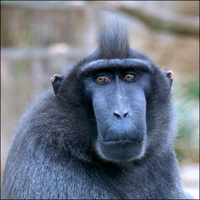
Country/State : Lille, FRANCE
Age : 60
Joined : 2010-04-01
Posts : 21169
 |  Subject: Re: Mathison Museum of Natural History Subject: Re: Mathison Museum of Natural History  Sun Nov 14, 2021 2:24 pm Sun Nov 14, 2021 2:24 pm | |
| Indeed, the surprise is not only which model Blaine will show us but how ?  |
|
  | |
bmathison1972

Country/State : Salt Lake City, UT
Age : 52
Joined : 2010-04-13
Posts : 6710
 | |
  | |
Kikimalou
Admin

Country/State : Lille, FRANCE
Age : 60
Joined : 2010-04-01
Posts : 21169
 |  Subject: Re: Mathison Museum of Natural History Subject: Re: Mathison Museum of Natural History  Sun Nov 14, 2021 2:46 pm Sun Nov 14, 2021 2:46 pm | |
| |
|
  | |
widukind

Country/State : Germany
Age : 48
Joined : 2010-12-30
Posts : 45745
 |  Subject: Re: Mathison Museum of Natural History Subject: Re: Mathison Museum of Natural History  Sun Nov 14, 2021 6:03 pm Sun Nov 14, 2021 6:03 pm | |
| |
|
  | |
Saarlooswolfhound
Moderator

Country/State : USA
Age : 28
Joined : 2012-06-16
Posts : 12056
 |  Subject: Re: Mathison Museum of Natural History Subject: Re: Mathison Museum of Natural History  Mon Nov 15, 2021 5:18 am Mon Nov 15, 2021 5:18 am | |
| One of my favorite "local" species! _________________ -"I loathe people who keep dogs. They are cowards who haven’t got the guts to bite people themselves."-August Strindberg (However, anyone who knows me knows I love dogs [You must be registered and logged in to see this image.] ) -“We can try to kill all that is native, string it up by its hind legs for all to see, but spirit howls and wildness endures.”-Anonymous |
|
  | |
Joliezac
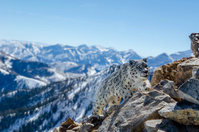
Country/State : New Jersey, USA
Age : 22
Joined : 2021-04-26
Posts : 2428
 |  Subject: Re: Mathison Museum of Natural History Subject: Re: Mathison Museum of Natural History  Mon Nov 15, 2021 5:37 am Mon Nov 15, 2021 5:37 am | |
| Great model! I have the same sculpt made by Schleich and its a gorgeous figure.. I wish someone would make some kids of this species 
_________________
Jolie
Animal Ark Website
Animal Figure Photography Website
|
|
  | |
bmathison1972

Country/State : Salt Lake City, UT
Age : 52
Joined : 2010-04-13
Posts : 6710
 |  Subject: Re: Mathison Museum of Natural History Subject: Re: Mathison Museum of Natural History  Mon Nov 15, 2021 12:58 pm Mon Nov 15, 2021 12:58 pm | |
| - Saarlooswolfhound wrote:
- One of my favorite "local" species!
have you seen them? I haven't, yet, but they are in the area. Next up: Species: Actias artemis (Bremer et Grey, 1853) (Japanese luna moth) About the Figure: Manufacturer: Ikimon Series: Science Techni Colour - Private Specimen of a Lepidopterist Acrylic Mascot 2 Year of Production: 2019 Size/Scale: Wingspan 4.8 cm for a scale of 1:1.7-1:2 Frequency of species in toy/figure form (at time of posting): Unique Miscellaneous Notes: The figures in this set are essentially photographs of butterflies and moths embedded in acrylic. Flip the figure over and the underside reveals an image of the ventral side of the animal, too. They are also sold as keychains (hence the hole in the acrylic above the head). About the Animal: Geographic distribution: Northeast Asia (Russia, Korea, northeast China, Japan) Habitat: Hardwood forests Diet: Larvae feed on a variety of plants, including Salix (willow), Alnus (alder), Carya (hickory), Quercus (oak), Acer (maple), Prunus (plum), and Juglans (walnut); adults do not eat IUCN Status (at time of posting): Not Evaluated Miscellaneous Notes: More research is needed to determine the full extent of this species' geographic distribution, and whether or not the current concept of A. artemis represents a single species or a cryptic species complex. [You must be registered and logged in to see this image.] |
|
  | |
Caracal

Country/State : France
Age : 65
Joined : 2018-10-24
Posts : 7252
 | |
  | |
widukind

Country/State : Germany
Age : 48
Joined : 2010-12-30
Posts : 45745
 |  Subject: Re: Mathison Museum of Natural History Subject: Re: Mathison Museum of Natural History  Mon Nov 15, 2021 6:17 pm Mon Nov 15, 2021 6:17 pm | |
| |
|
  | |
bmathison1972

Country/State : Salt Lake City, UT
Age : 52
Joined : 2010-04-13
Posts : 6710
 |  Subject: Re: Mathison Museum of Natural History Subject: Re: Mathison Museum of Natural History  Tue Nov 16, 2021 12:35 pm Tue Nov 16, 2021 12:35 pm | |
| Species: Vespa mandarinia Smith, 1852 (Asian giant hornet) About the Figure: Manufacturer: Shine-G Series: Larvae Moei Year of Production: unknown Size/Scale: length 3.7 cm, within scale 1:1 for a large larva Frequency of species in toy/figure form (at time of posting): Uncommon Miscellaneous Notes: The Larvae Moei collection is a set of stylized larvae of lepidopterans and this single hymenopteran. The brood cells in this image were borrowed from a life cycle set of V. mandarinia by Epoch. About the Animal: Geographic distribution: Southeast Asia; recently established in the Pacific Northwest of North America Habitat: Forests Diet: Larvae are feed insects provided by adults; adults are predaceous on insects, but will also eat tree sap and overripe fruit. Adults will also eat Vespa amino acid mixture produced by the larvae. IUCN Status (at time of posting): Not Evaluated Miscellaneous Notes: Larvae of V. mandarinia are fed a paste that consists of masticated insect prey harvested by the adults. Unlike the adults, the larvae are able to digest solid protein. Larvae will produce a silk cocoon for pupation. [You must be registered and logged in to see this image.] |
|
  | |
Sponsored content
 |  Subject: Re: Mathison Museum of Natural History Subject: Re: Mathison Museum of Natural History  | |
| |
|
  | |
| | Mathison Museum of Natural History |  |
|
